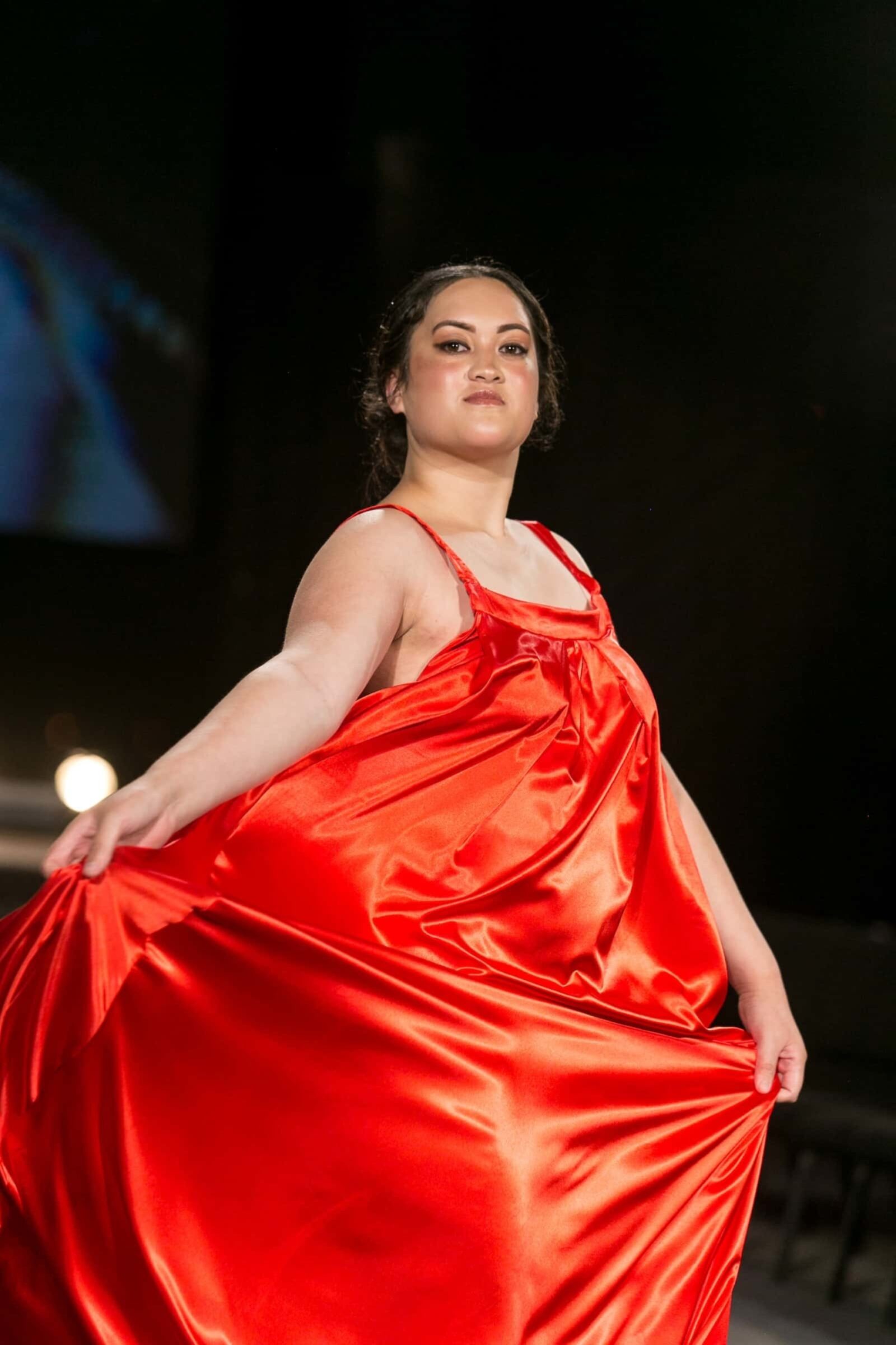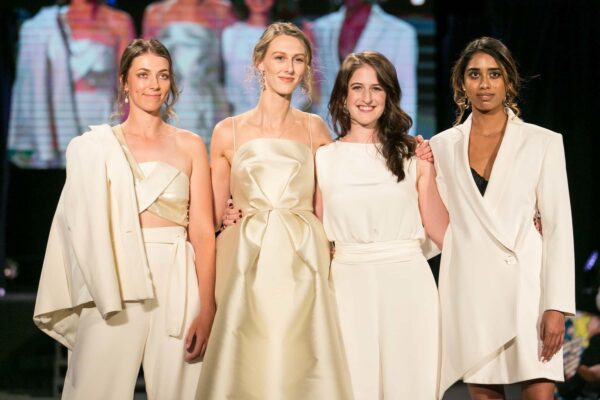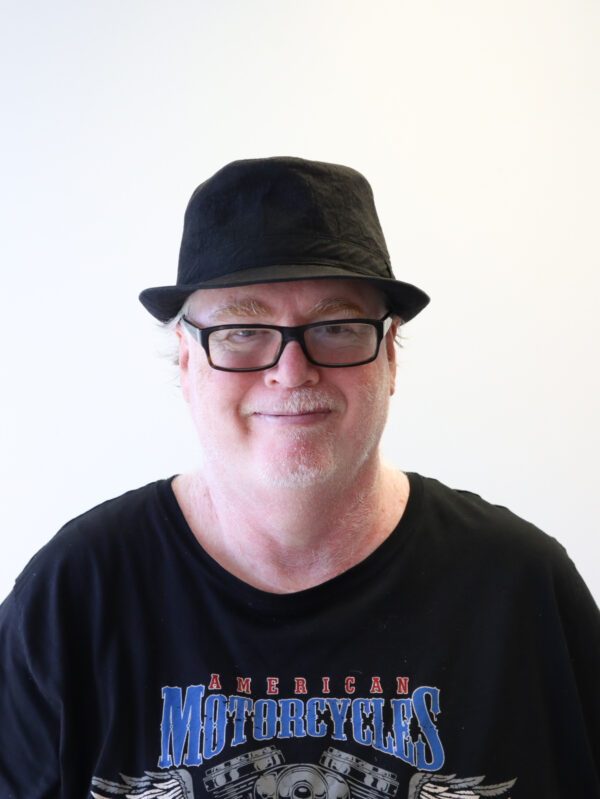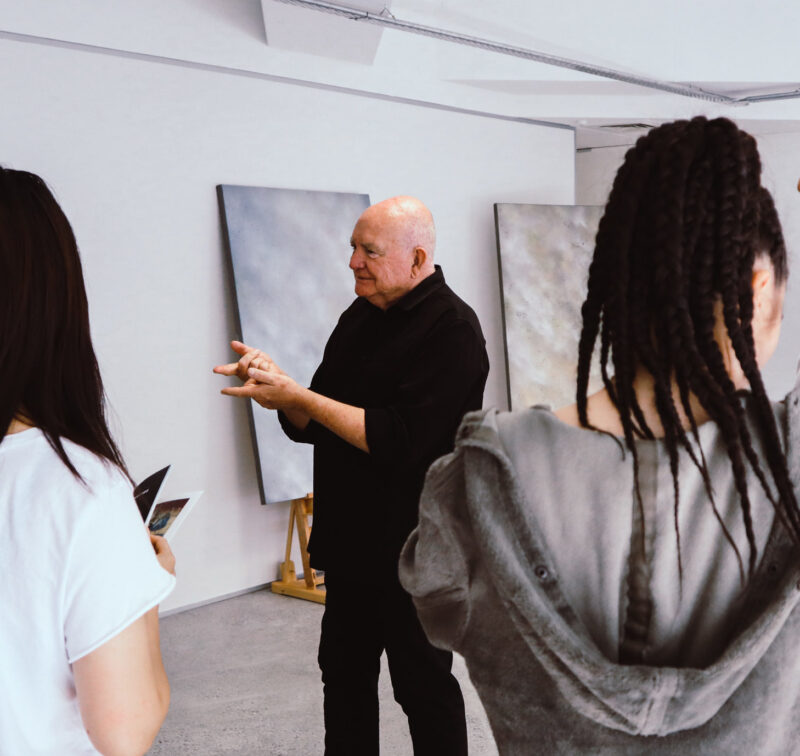Diploma in Apparel + Fashion Technology
*This programme is closed for new enrolments.
In this programme, students further develop the skills and knowledge of the two certificate programmes to a more advanced level.
Students use and refine advanced skills in patternmaking, fit, garment construction, and production to create lingerie, swimwear, and tailored garments.
Commercial fashion design comes to life in exciting design projects, and students will design and make a graduate collection which is presented at the annual Whitecliffe Fashion Show.
Please confirm availability of the new version of this programme with the Whitecliffe Admissions Team.

Duration
38 weeks, full-time in Auckland + Wellington
Qualification
Diploma in Apparel + Fashion Technology (level 5) 120 Credits
Costs
Domestic $7465+ $300 Student Services Levy International $18,460 + $300 Student Services Levy Fees free may apply All 2023 fees are subject to change and regulatory approval.
View full fees











Diploma in Apparel + Fashion Technology Course Outline
*This programme is closed for new enrolments.
In this programme, students further develop the skills and knowledge of the two certificate programmes to a more advanced level.
Students use and refine advanced skills in patternmaking, fit, garment construction, and production to create lingerie, swimwear, and tailored garments.
Students learn CAD and Pattern Aided Design (PAD) to make, digitise, and grade patterns, and learn to create digital drawings and storyboards, as well as extending their knowledge of textile technology and garment manufacturing. Commercial fashion design comes to life in exciting design projects, and students will design and make a graduate collection which is presented at the annual Whitecliffe Fashion Show.

Why choose Whitecliffe Fashion Tech?
- We offer programme delivery in the practical, hands-on, technical aspects of the fashion industry.
- Each year we have high numbers of successful employment placements within the fashion industry with graduates in skilled positions such as fashion design, merchandising, production, and manufacture, fashion styling/buying/retail, and other areas of production management and commercial fashion design.
- Students in all programmes are immersed in activities that are rich and real; their learning is personally meaningful and is an active processing experience.
- Classrooms are set up to replicate apparel and fashion workrooms, and practical, industry-based sessions replicate working in the industry.
- Our tutors and support staff bring extensive and valuable industry knowledge to the programmes, and in preparing students for a career in the fashion industry.
- Multiple teaching methods and delivery strategies are used to meet the needs of our target learner group and maximise opportunities for students to receive and retain information, promote active engagement with materials, and engage in their own learning and the learning of others.
- Work experience and internships are a valuable and integral part of all our programmes and enable students to put their learning into context.

Resene Colour of Fashion
Creative flair, a stunning colour palette, and exquisite silk - three elements that come together in the Resene Colour of Fashion project. This exciting project takes students out of the classrooms and into a contemporary world of colour and design to bring Resene’s fashion colours to life, contributing in an exciting, collaborative way to fashion education at Whitecliffe.
Students receive a length of silk dyed to match one of the latest Resene fashion palette colours. They have four weeks following a brief to design and create a look that would light up a catwalk. The garments are modelled before a judging panel and each year a number are selected to open the Resene Designer Runways at New Zealand Fashion Week.

Diploma in Apparel + Fashion Technology Programme Structure
- DFT 1: Advanced Pattern Technology
Use advanced patternmaking skills to make (develop) or adapt and grade patterns for design and/or fit of unstructured and structured garments in a comprehensive range of styles and fabric types. In this context, structured garments include lingerie or undergarments, swimwear, and tailoring. Patterns cut, sewn, and finished to high-quality workplace requirements. - DFT2: Production Technology
Use knowledge of garment assembly operations to define sequencing for job breakdowns, and develop manual spec sheets for a range of garments that match produce end-use and legal requirements - spec sheets may include job breakdowns, lay plans, fabric information, size specs, apparel componentry, and care label requirements, spec drawings, and garment costing. It also includes hand drawing techniques for spec drawing and garment/fabric drawings/sketches and creating commercial storyboards. - DFT 3: Textile and Apparel Technology
Apply knowledge of fabric properties and composition to make appropriate fabric selections that match product end-use. Use apparel componentry (may include notions and trims including labels, thread, needles, and fastenings etc.) knowledge to make appropriate selections that match product end-use and customer requirements. It also includes knowledge of methods used to manufacture and cost a range of garment products. - DFT 4: Design (CAD) Technology
Application and use of Microsoft Word/Excel and CAD programmes to make (develop), digitise, and grade patterns, create lay plans and spec sheets, scale spec drawings, garment/fabric drawings, and commercial digital storyboards. - DFT 5: Garment Design Technology
Ability to gather design research and compile a portfolio, interpret a client brief and research, and design a new project or garment design/s to present to the customer for approval. Students will adjust style/s and/or pattern/s to meet customer feedback requirements.

Graduates will be able to:
- Use advanced technical skills to make, adapt, and grade flat patterns for structured and unstructured garments in a comprehensive range of styles and fabric types.
- Create detailed manual specification sheets and commercial storyboards.
- Select fabrics and apparel componentry to product end-use.
- Use CAD and PAD (Pattern Aided Design) to make, digitise, and grade patterns, create lay plans, and specification sheets, and draw garments.
- Analyse a client brief to research, design, and present a new project of garment design to meet client requirements.

Key Information for Students
NZ Government key information link for students, that provides more information to support your decision making for this programme

Admission Requirements
Domestic Student Entry Requirements:
- Completed application form
- Minimum Age: Students must turn 17 within their first year of study at Whitecliffe
- Students must have completed the Certificate in Apparel and Fashion Technology - Patternmaking qualification or be able to demonstrate:
- Equivalent industry experience
- Effective workplace communication skills
- Knowledge and understanding of current Health and Safety practices
- A competent level of literacy and numeracy
- Basic computer literacy
- An entry exam may be required to test the applicant's literacy, numeracy, pattern recognition, garment construction, sequencing, and sewing skills
International Student Entry Requirements:
- Completed application form
- Passport copy
- Minimum Age: Students must turn 18 within their first year of study at Whitecliffe
- IELTS Academic overall score of 5.5 with no band less than 5.0 or equivalent
- Students must have completed 10 years of schooling and achievement equivalent to the NCEA Level 2 qualification
- Students must have completed the Certificate in Apparel and Fashion Technology - Patternmaking qualification or be able to demonstrate:
- Equivalent industry experience
- Effective workplace communication skills
- Knowledge and understanding of current Health and Safety practices
- A competent level of literacy and numeracy
- Basic computer literacy
- An entry exam may be required to test the applicant's literacy, numeracy, pattern recognition, garment construction, sequencing, and sewing skills
BYOD (Bring Your Own Device) Requirements:
Recently we have found ourselves working remotely due to COVID-19, we recommend that you have your own device to support your studies. The following specifications are intended to help you make the best choice of laptop, desktop or tablet for the job.
Recommended IT Specifications:
Minimum Hardware requirements
- Mac - Intel processor with 64-bit support; 2 GHz or faster processor with SSE 4.2 or later
OR - MacBook Air with M1 Chip
OR - Intel® or AMD processor with 64-bit support; 2 GHz or faster processor with SSE 4.2 or later
- 8 GB RAM (Recommended 16 GB)
- 250 GB SSD or higher hard drive with 10GB free space minimum
- Wireless capability 802.11n dual-band
- Up-to-date antivirus software
Minimum Operating System
- Windows 10 (64-bit) version 1809 or later; LTSC versions are not supported
OR - Apple macOS Mojave (version 10.14) or later
- Internet and data plan.
Not Supported:
- Chromebooks
- Windows X or Windows S OS
- Tablets (except Windows Surface Pro or iPad Pro)

Graduate Story: Jerome Taylor
A label at the top of our talent-to-follow list is Not For You. The up and coming star behind the menswear brand is Jerome Taylor, a 27 year-old Wellingtonian who started from humble beginnings. After graduating from NZ Fashion Tech he was selected to show capsule collections in 2016 & 2017 at New Zealand Fashion Week and also showcased his work in Project Fashion Wellington.
Earlier this year he was selected to show at Vancouver Fashion Week where he received international recognition. Vogue China has described his look as “stylish” “unique” and “full of attitude”, and celebrities such as Miss J Alexander have donned his pieces.
Next week he’ll be impressing the fashion industry with his very own show at NZ Fashion Week. With an estimated 300 people attending, it’s shaping up to be an epic show. We recently caught up Jerome to chat through his take of fashion, scroll down to read our full interview with the man himself.
When did your interest in fashion start?
My interest in fashion came from my love of art, in particular graffiti. If you asked me at high school what I wanted to be, never would I have said a fashion designer. Getting into fashion was a progression from my artwork.
What do you love most about what you do?
I love that I have found something that I am good at, that I can do everyday. I have this amazing platform in which I can share with the world but with this I can also empower others and hopefully push anyone to see that if you back yourself you can do anything.
How did you get into the fashion industry?
I studied with NZ Fashion Tech from 2013-2015 and from here I took advantage of every opportunity. My first show outside of studying was at New Zealand Fashion Week 2016, I was then a part of Project Fashion Wellington early 2017, New Zealand Fashion Week for the second time late 2017. Lastly, I showcased in my first international show in Vancouver. I have seized every opportunity and don’t intend to stop!
Why did you choose NZ Fashion Tech? What did you enjoy most about the courses?
I chose NZ Fashion Tech as it was the most hands on with the most practical skills on offer. I wanted to learn the design process from start to finish. I researched multiple courses however NZ Fashion Tech had everything I needed to become a successful designer where I can be a part of the whole process.
What was your favourite work experience at NZ Fashion Tech?
My favourite work experience was Hills Hats as I learnt so much about the whole process of hat making. I also thought it was really cool that the process has remained the same for the past 40+ years.
Tell us about your experience in the Resene NZ Fashion Tech Colour of Fashion competition?
I enjoyed my experience with Resene. I liked the new challenge of working with silk and the new challenges I faced with the fine details of the garments we had to create.

Faculty

Doula Matheos
Programme Leader, Fashion Technology Programmes (Wellington)Doula graduated with an Advanced Diploma in Fashion Design and Technology from Wellington Polytechnic, and achieved 2 awards in the DuPont Lycra Fashion Awards.
Continue reading
Pip Stevenson
Lecturer, School of Fashion + SustainabilityPip has been working in the Fashion Industry since completing her Bachelor of Design (Fashion) at Otago Polytechnic in 2002.
Continue reading
Angela Newson
Lecturer, School of Fashion + SustainabilityAngela holds a Diploma in Fashion Design and Technology from Massey University, where on completion she was bestowed the Clothing Institute Award for Tailoring.
Continue reading
Harita Kapur
Lecturer, School of Fashion + SustainabilityHarita holds a Master's Degree in Sustainable Design from Massey University, New Zealand.
Continue reading
Giles Peterson
Lecturer, School of Fashion + SustainabilityGiles lectures in contextual studies in New Zealand / Pacific art and design history; Contemporary art and design history, Fashion theory and more.
Continue reading
Susan Barter
Lecturer, School of Fashion + Sustainability30 years as a designer, practitioner and maker in the Fashion industry was a gateway to the academic world where Susan completed a Masters of Art & Design at AUT.
Continue reading
Heather Hohenberger
Lecturer, School of Fashion + SustainabilityHeather has been involved in the Fashion Industry since she and her husband bought a fashion production company in 1980.
Continue reading
Christina Doherty
Lecturer, School of Fashion + SustainabilityChristina has made wonderful and diverse career out of Fashion Design, focusing on lingerie design + women's outer-wear.
Continue reading
SuJin Lim
Lecturer, School of Fashion + SustainabilitySuJin is an experienced jewellery CAD designer who has been serving the New Zealand industry since 2010
Continue reading
Julia Marin
Lecturer, School of Fashion + SustainabilityJulia was trained at UBA (Universidad de Buenos Aires) and SURJA (Sindicato Unificado de Relojeros y Joyeros de Argentina) in Argentina; Peter Minturn Jewellery School and MIT in New Zealand. She also works as a custom jeweller, does film and conceptual work.
Continue reading
Daisy Jiang
Lecturer, School of Fashion + SustainabilityDaisy is a Level 4 lecturer based on our Manukau campus. Daisy holds a unique perspective of the New Zealand fashion industry, her work combines traditional craftsmanship and influences from both Eastern and Western cultures.
Continue readingWhere could this programme take you?
Pathway to further qualifications such as our Bachelor of Fine Arts programme (year 2).
Jobs related to this programme
• Fashion Design
• Merchandising
• Fashion Buying
• Fashion Styling
• Pre-production
• Production and Manufacture
• Fashion Retail
• Marketing + Sales in Fashion
Industry Partners
Fashion + Sustainability






Talk to our team

If you would like to ask us a question or request more information, please detail your enquiry using the form below. If you would like you can contact us directly on 0800 800 300, email us or use the contact us form.


